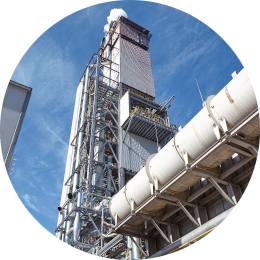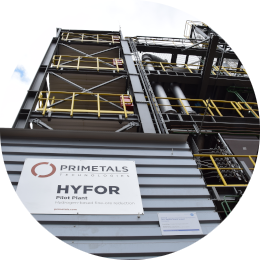Tackling the root cause of emissions
A decisive shift away from carbon-based sources of energy is the only way forward for sustainable steel. As a pioneer in direct reduction technology, Primetals Technologies is the right partner if you are looking to apply hydrogen in commercially proven solutions or would like to explore new pathways with cutting-edge ironmaking technology.
MIDREX® H2
Until today, MIDREX technology typically operated using natural gas, with the option to replace 30 percent of the natural gas with hydrogen in existing plants with no change needed to the equipment. If higher ratios of hydrogen are desired, the plant requires minor modifications to facilitate the new process conditions. The major change in function is to the reformer, because with increasing amounts of hydrogen it’s working more as a heater than a reformer. Due to the still-high cost of hydrogen, it’s been proposed to start with natural gas as the energy carrier. As soon as green hydrogen is available in the required quantity and quality and at a competitive price, the MIDREX plant can be operated using the new natural gas/hydrogen mixture as required.
With the option to use hydrogen, the MIDREX process continues to be the most innovative and reliable direct reduction process worldwide.

HYFOR®
The newly developed HYFOR (Hydrogen-based fine-ore reduction) process is the world’s first direct reduction process for iron ore concentrates that doesn’t require pre-processing such as sintering or pelletizing. This new technology can be applied to all types of beneficiated ores, and allows up to 100 percent of the particles to be smaller than 0.15 mm. As a reduction agent, HYFOR uses up to 100 percent H2 from renewable energy, H2-rich gases from conventional steam reformers, or H2-rich waste gases. This results in a low or even a zero CO2 footprint. The direct reduction plant features a modular design with a rated capacity of 250,000 tons per year, making it scalable for steel plants of all sizes.
A pilot plant for testing purposes has already been constructed at voestalpine Stahl Donawitz, Austria.

